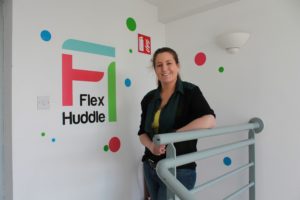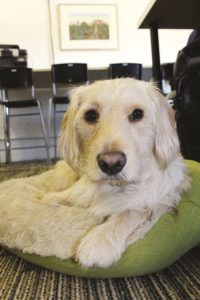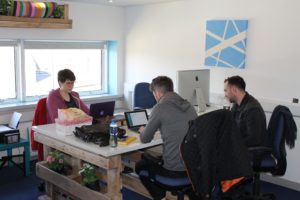INBUSINESS FEATURE: The Rise of Co-Working Culture

Everyday new start-ups and innovators are emerging from the ever more popular co-working office spaces scattered around the country. But what exactly is co-working and how is it changing the landscape of the Irish workplace? ORLA CONNOLLY finds out more.
The concept of co-working is built upon a simple understanding: a group of professionals who have come together to rent a shared office space for individual projects. However, more than just a financially beneficial office-sharing scheme, the underpinning quality of co-working is that it provides community and social support for those who would normally work in isolation. The core market for this this type of environment consists of start-ups, entrepreneurs and freelancers, those who typically linger in coffee shops accompanied by their laptops and a healthy Wi-Fi connection. But there are only so many coffees you can sit over, and while the option of working from home has its benefits, without a vibrant office environment, there is always a threat of cabin fever or worse still, a decline in productivity levels.
Most people working within a co-working group tend to be self employed, and according to Sinéad Geraghty, co-founder of Dublin-based co-working space, FlexHuddle, this is what makes them so driven, leading to an extra motivated atmosphere within the co-working environment. “It’s all about the people you get into the space,” she explains. “We have people who’d usually have their own office or are working on their own, they’re quite driven people because it’s their own businesses, they set their own hours. So there’s a lot of positivity in the space. People come in and see what other people are getting up to and bounce ideas off of each other.”
A Place to Collaborate
One considerable draw of co-working for anyone in business is the high potential for collaboration with other professionals. The fluid influx of members allows for a wealth of networking opportunities across a wide span of industries. According to Geraghty, it’s common for members of the same co-working space to collaborate on projects after an informal chat around the office, the type of interaction that routinely occurs at FlexHuddle. “We had a few developers here and over tea and coffee they’d be chatting about what they’re up to and someone might suggest a little improvement that they’d never even thought about.”
It’s really a chance to network while being present at work. While working from home can leave you with a depleted source of professional connections that can be difficult to grow, co-working presents a very different offering. Geraghty herself sees networking as a vital aspect of the FlexHuddle structure where members are constantly encouraged to build a solid foundation of contacts.
“If you were sitting in your house on your own you’d probably have a business network of about 100 people, but you come into this co-working space and there’s 20 other people around you and each of those have 100 people in their network,” she says. In order to provide a platform for such networking and collaboration, FlexHuddle, and offices like them, helps members connect in a more relaxed social setting. Geraghty organises regular social events such as business lectures or a members night out, have proved popular in the office.
FlexHuddle
Concering FlexHuddle, it was the concept of community – which is largely considered the most important part of co-working – that initially roused Geraghty and her co-founder John White to the idea for the company. The growth of Geraghty’s own start-up, Stowaway (a clever ceiling storage unit for people who want to maximise their limited storage space), afforded her the opportunity to hire staff, yet the idea of working in isolation with another person seemed daunting and encouraged her to research alternative working arrangements. Inspired by similar co-working arrangements she’d known of in San Francisco, Geraghty set about starting her own co-working space.

Now she is operating a fully functioning and successful co-working office space in Rathmines, complete with 20 start-ups across a variety of business sectors. “We’re looking to expand in July because it’s really taken off,” Geraghty reveals. “We’re at about 95 per cent capacity.”
Despite the success, getting FlexHuddle off the ground was not without its challenges. Being self-funded, Geraghty and her partner had little start-up capital, and this meant she relied heavily on her resourceful nature to furnish the space. The end product is impressive. “We built the desks ourselves!” she says with pride. “We have pallets as desks and the tops are from IKEA. We sanded, waxed and polished them to make it a bit funky and then we painted the whole space ourselves.” As a result, FlexHuddle has managed to stamp its own unique brand of individuality on the co-working movement, all the more with the addition of a ‘Chill Zone’, an ideal place to hang out with FlexHuddle mascot; Geraghty’s dog, Bailey.
Playing Catch-Up
From an international perspective, Ireland has a rather poor standing compared to its peers when it comes to embracing the co-working phenomenon, although we are beginning to see more co-working spaces open in the main start-up hubs; the latest being a 50-desk space opened by SuperPixel Labs in Galway city in February, proving that it’s not just a concept for the capital.
Geraghty says the country is still playing catch-up but there is opportunity to vastly improve our placing. “We’re currently at about 2012 standards compared to Europe and about 2011 standards compared to the US,” she says. In a bid to improve this, Geraghty hopes to attract the Annual Coworking Europe Conference to these shores in November 2016, an event which has previously been held in Berlin, Paris, Barcelona and Lisbon. If successful, the conference will play host to 500 co-working space operators and facilitators from all over over the globe. One issue Geraghty would hope to highlight at the event is the responsibility the Government has in supporting the co-working community. “There’s a lot of derelict buildings throughout Dublin city and if you transformed them into a co-working space, then you could actually have thriving businesses operating in that space. That’s what the co-working conference would heighten.”
With Deskmag, an online magazine dedicated to co-working, reporting that 10,000 co-working spaces will open globally by the end of 2016 and researchers from the Global Coworking Unconference Conference predicting that there will be a community of 1 million co-workers worldwide by 2018, there can be no doubt that the trend is set to continue.
But where is it all headed? Many experts speculate that major corporations will try to utilise co-working by sourcing these spaces for their more nomadic workers. This will be made all the more easy by the fact that many larger co-working spaces are now co-ordinating with one another in a process called ‘twinning’. The aim is to link up numerous co-working spaces and allow travelling members to set up a desk in foreign cities or countries along their travel route. Roam, a US-based co-working space, for instance, has four locations that members can operate between and rent desk space from.
As twinning becomes a more prevalent topic of discussion within the co-working community, many believe it’s the natural evolution for the movement. Either way, small independent co-working spaces such as FlexHuddle will continue to exist and house innovative start-ups and entrepreneurs, hopefully enhancing Ireland’s status as an international tech hub and a great country to do business in.

Housed in FlexHuddle
A glance at five of the start-ups using the FlexHuddle co-working space…
Sonarism
SonarSim Ltd. is dedicated to the delivery of high-fidelity, immersive-reality, hydrographic SONAR simulation, processing, and visualisation software.
Vanguard Beer Collective
Vanguard Beer Collective is the one stop shop for Irish craft beer.
Think Academy
The Think Academy is a fun maths education programme for junior cycle post-primary students.
GroupVite
GroupVite is a fair and equitable tool to split the cost of an activity amongst a group.
George Hooker Films
George Hooker is a director, producer, and photographer, specialising in short-form video, commercial, music video, documentary and narrative.